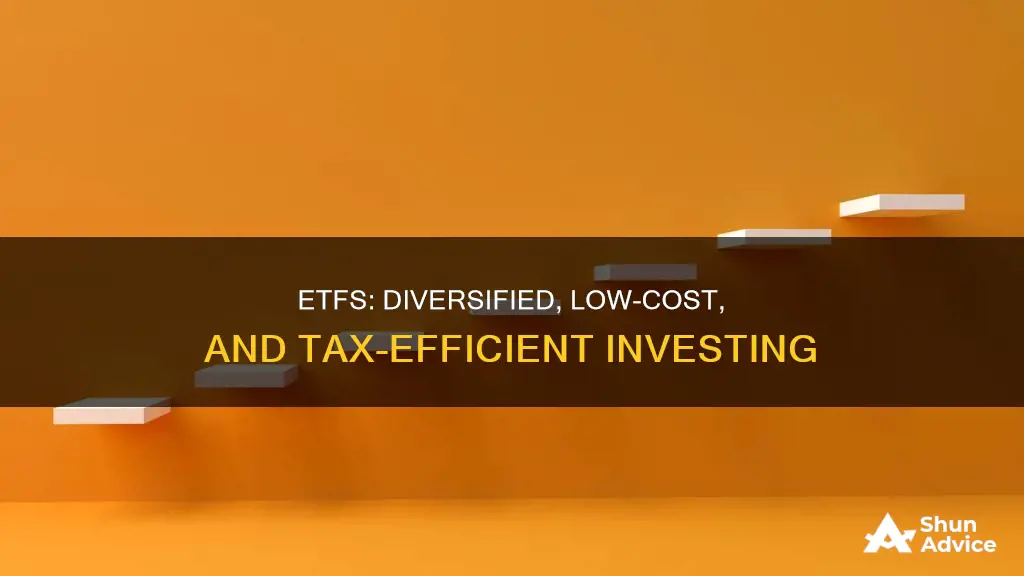
Exchange-traded funds (ETFs) are a popular investment vehicle that offers a range of benefits for investors. One of the main advantages of ETFs is their ability to provide instant diversification by allowing investors to access a diverse group of holdings with a single transaction. ETFs typically hold a basket of assets, such as stocks, bonds, or commodities, and trade on a market exchange, providing exposure to specific industries, regions, or sectors. They are also known for having lower fees and being more tax-efficient than other types of funds. Additionally, ETFs offer flexible trading, greater transparency, and the ability to purchase in small amounts, making them a valuable tool for investors seeking to lower risk and improve portfolio returns.
| Characteristics | Values |
|---|---|
| Efficiency | ETFs can efficiently diversify your portfolio without having to select individual stocks or bonds. |
| Selection | They cover most major asset classes and sectors, offering a broad selection. |
| Accessibility | International, regional, and industry-specific ETFs provide access to sectors where it may be more difficult to buy and sell individual stocks and bonds. |
| Cost | Operating expense ratios (OERs) for ETFs are typically low. |
| Flexibility | ETFs are versatile, allowing you to easily move money between specific asset classes, like stocks, bonds, or commodities. |
| Tradability | They trade like stocks, meaning you can trade them anytime during market hours. |
| Transparency | Most ETFs disclose their holdings on a daily basis. |
| Tax efficiency | Due to typically lower turnover and the in-kind creation/redemption process, ETFs generally pass through fewer capital gains to investors. |

Low-cost, diverse portfolios
Exchange-traded funds (ETFs) are an increasingly popular investment option for building a simple, low-cost, and diverse portfolio. They are an effective way to diversify your portfolio without having to select individual stocks or bonds. ETFs are traded on stock exchanges and can be bought and sold throughout the day, like individual stocks.
ETFs are an excellent option for investors who want to invest in many different things without needing a lot of money. A single share of an ETF can provide exposure to a basket of assets, such as stocks, bonds, or commodities, rather than just a single asset. This diversification helps to reduce the overall risk of an investment portfolio.
ETFs are also accessible across various markets, including stocks, bonds, commodities, real estate, and hybrids. They can be tailored to suit an investor's needs, with options to target specific assets aggressively or defensively or to focus on a broad range of assets.
Most ETFs are passively managed, tracking a benchmark index rather than actively trying to beat the market. This passive investing approach can be more cost-effective, as there are typically lower overhead costs and investment fees. ETFs generally charge investors a lower operating expense ratio than actively managed mutual funds, resulting in cost savings for investors.
In summary, ETFs offer a low-cost, diverse portfolio option for investors. They provide instant diversification, broad market access, and cost savings compared to other investment options.
Utility ETFs: A Risky Bet for Investors
You may want to see also

Reduced risk
Exchange-traded funds (ETFs) are considered a low-risk investment option. They are a popular way to build a simple, low-cost, and diverse portfolio. Here's how they help reduce risk:
Diversification
ETFs offer instant diversification, allowing investors to invest in a basket of assets such as stocks, bonds, or commodities with a single trade. This diversification helps reduce the overall risk of an investment portfolio. By investing in a range of assets, investors lower their exposure to individual stock risk. ETFs provide access to a wide range of asset classes, sectors, and industries, both domestically and internationally. This diversification would be much more cumbersome and expensive to achieve by buying individual stocks.
Lower Costs
ETFs are typically passively managed, tracking a benchmark index rather than actively trying to beat the market. This passive investing approach reduces overhead costs and investment fees, making ETFs a low-cost option. They generally have lower operating expense ratios than actively managed mutual funds.
Tax Efficiency
ETFs tend to be more tax-efficient than mutual funds as they generate fewer capital gains. Passively managed ETFs have lower turnover, resulting in fewer asset sales and, consequently, lower capital gains. This gives investors more control over when they incur taxes.
Liquidity
The most popular ETFs trade with high liquidity, meaning there are plenty of buyers and sellers, ensuring narrow bid-ask spreads. This liquidity further reduces risk by making it easy to buy or sell ETFs at any time during market hours, just like individual stocks.
Transparency
Most ETFs disclose their holdings daily, providing transparency into the underlying investments. This transparency helps investors make informed decisions and manage their risk exposure.
In summary, ETFs are a low-risk investment option due to their diversification benefits, low costs, tax efficiency, liquidity, and transparency. They provide a convenient and flexible way to build a well-diversified portfolio, reducing the overall risk for investors.
A European's Guide to US ETF Investing
You may want to see also

Passive income
Exchange-traded funds (ETFs) are an increasingly popular investment option for those seeking passive income. Here are some key benefits of ETFs in generating passive income:
Portfolio Diversification:
ETFs offer an efficient way to diversify your investment portfolio without the need to select individual stocks or bonds. By investing in an ETF, you gain exposure to a basket of assets, reducing the overall risk of your investments. This diversification is accessible at a low cost, making it a viable option for investors with varying financial backgrounds.
Accessibility and Flexibility:
The wide range of ETFs available in the market—covering stocks, bonds, commodities, real estate, and hybrids—allows investors to find investment options that align with their goals. ETFs are also accessible across different markets, including international and regional options, making them a flexible tool for investors looking to invest in specific sectors or countries.
Passive Investing and Low Costs:
Most ETFs are passively managed, meaning they track a benchmark index rather than actively trying to beat the market. This passive approach often results in lower operating expense ratios compared to actively managed mutual funds, reducing investment fees for the investor. Passive investing through ETFs can be more cost-effective, especially when compared to the management fees associated with active investing.
Tax Efficiency:
ETFs tend to be more tax-efficient than mutual funds due to their passive nature. They typically generate fewer capital gains, resulting in lower capital gains taxes. Additionally, ETFs provide investors with more control over when they incur taxes, as they may not have high capital gains or income distributions each year.
Transparency and Liquidity:
ETFs offer transparency by disclosing their holdings daily, allowing investors to know exactly what assets the ETF holds. This transparency, combined with the ability to trade ETFs throughout the day on stock exchanges, provides liquidity to investors. However, it is important to consider the potential costs associated with short-term trading, as commission expenses can add up over time.
In summary, ETFs are a popular choice for passive income seekers due to their low costs, diversification benefits, accessibility, tax efficiency, and transparency. They provide a convenient and flexible way to invest while potentially reducing overall investment risks.
ETFs: Understanding Their Status Under the 1940 Act
You may want to see also

Tax efficiency
Exchange-traded funds (ETFs) are a popular investment vehicle that offers a range of benefits, including the potential for tax efficiency. Here are some key considerations regarding the tax efficiency of ETFs:
Lower Capital Gains Taxes
ETFs tend to be more tax-efficient than other investment options, such as mutual funds. This is because ETFs, particularly passively managed ones, generally have lower turnover rates, resulting in fewer capital gains distributions to investors. Mutual funds, on the other hand, are required to distribute capital gains to shareholders when they sell securities for a profit, which can lead to taxable events.
The passive management nature of many ETFs contributes to their tax efficiency. Passively managed ETFs are designed to track a specific index or benchmark, and they typically have lower turnover as they are not actively buying and selling assets to beat the market. This lower turnover results in fewer taxable events for investors.
In-Kind Creation/Redemption Process
The in-kind creation/redemption process of ETFs also contributes to their tax efficiency. This process allows ETFs to minimise capital gains distributions by exchanging securities instead of cash when creating or redeeming shares. This means that capital gains can be deferred until the investor decides to sell their ETF shares.
Control Over Taxable Events
With ETFs, investors have more control over when they incur taxes. Since ETFs trade like stocks, investors can buy and sell shares at any time during market hours. This flexibility allows investors to manage their tax liability by strategically timing their purchases and sales.
Limited Capital Gains Tax
As ETFs are passively managed portfolios, they tend to realise fewer capital gains than actively managed funds. Actively managed mutual funds, on the other hand, may have higher capital gains taxes as they actively buy and sell securities, resulting in more frequent taxable events.
In summary, ETFs offer potential tax efficiency through lower capital gains taxes, tax efficiency and passive management, the in-kind creation/redemption process, and increased control over taxable events. However, it is important to note that taxes may still apply, and investors should carefully consider the tax implications of investing in ETFs within their specific jurisdiction.
Cannabis ETFs: Legal Investment Opportunities?
You may want to see also

Flexibility
Exchange-traded funds (ETFs) are a flexible investment option for a wide range of investors. Here are some reasons why:
ETFs are traded on stock exchanges and can be bought and sold throughout the market hours, much like individual stocks. This means investors can easily buy and sell ETFs, making them a convenient investment option. They also trade like stocks, meaning you can trade them anytime during market hours. This flexibility in trading may matter to certain investors.
With ETFs, there is no minimum purchase requirement. Since ETFs trade like stocks, there are advantages for position sizing. Small positions can be purchased to scale in or out of a position, or a single small position can be taken in a particular ETF. This makes ETFs a good investment strategy if you're looking to invest a lump sum of money for a long-term investment goal.
ETFs are accessible across markets, providing investors with a range of options to choose from, including stocks, bonds, commodities, real estate, and hybrids. They also vary in how they target certain assets—whether aggressively or defensively, or specific to one asset class or broad. This allows investors to build a diverse portfolio.
ETFs can be used in various investment strategies, including as part of a long-term buy-and-hold strategy or as a short-term trading tool. Investors can also trade thematic ETFs, which focus on specific trends or niche industries like robotics, artificial intelligence, or gender equality.
ETFs tend to be more tax-efficient than mutual funds because they typically generate fewer capital gains and capital gains taxes. This is because passively managed ETFs tend to have lower turnover than actively managed mutual funds, resulting in fewer capital gains. ETFs can also provide investors with more control over when they incur taxes.
Axis Nifty ETF: A Smart Investment Strategy?
You may want to see also
Frequently asked questions
ETFs, or exchange-traded funds, offer a range of benefits for investors, including:
- Diversification: ETFs provide instant diversification by investing in many assets at once, including stocks, bonds, commodities, and currencies. This reduces an investor's risk and is more time- and cost-efficient than buying individual stocks.
- Lower fees: ETFs often have lower fees than other types of funds, such as mutual funds, due to their passive management structure. They also avoid load fees and can be purchased with the same low commission as stocks.
- Flexibility: ETFs can be bought and sold during market hours, providing greater flexibility than traditional mutual funds, which are traded only once per day after the markets close.
- Tax efficiency: ETFs are generally more tax-efficient than mutual funds as they tend to realise fewer capital gains. Capital gains tax on an ETF is also only incurred when the investor sells the ETF, rather than throughout the life of the investment.
Other benefits of investing in ETFs include:
- Transparency: ETFs disclose their holdings on a daily, monthly, or quarterly basis, providing greater transparency than mutual funds.
- Liquidity: The most popular ETFs trade with high liquidity, meaning there are plenty of buyers and sellers and narrow bid-ask spreads.
- Reinvestment: ETFs allow for the immediate reinvestment of dividends, which may vary in timing for mutual funds.
- Small investments: ETFs can be purchased in small amounts, with no minimum investment, making them accessible to small investors.
While ETFs offer numerous benefits, there are also some potential disadvantages to consider:
- Over-diversification: ETFs may participate in over-diversification, tracking an index that includes underpriced or low-performing stocks. Actively managed funds may be able to provide better returns by selecting individual stocks.
- Limited diversification: In certain sectors or for foreign stocks, ETF investors may be limited to large-cap stocks due to a narrow group of equities in the market index.
- Intraday pricing: Intraday pricing movements could induce longer-term investors to trade unnecessarily or make emotional trading decisions.
- Costs: While ETFs generally have lower costs than mutual funds, they may have higher costs compared to investing in specific stocks, as there is no management fee for individual stocks.
- Lower dividend yields: ETFs may have lower dividend yields than owning individual high-yield stocks.
When selecting ETFs for your portfolio, it is important to consider your investment goals and risk tolerance. Evaluate ETFs based on management costs, commission fees, how they fit into your existing portfolio, and their investment quality. It may also be beneficial to combine ETFs with individual stocks to mitigate some of the disadvantages of ETFs.







